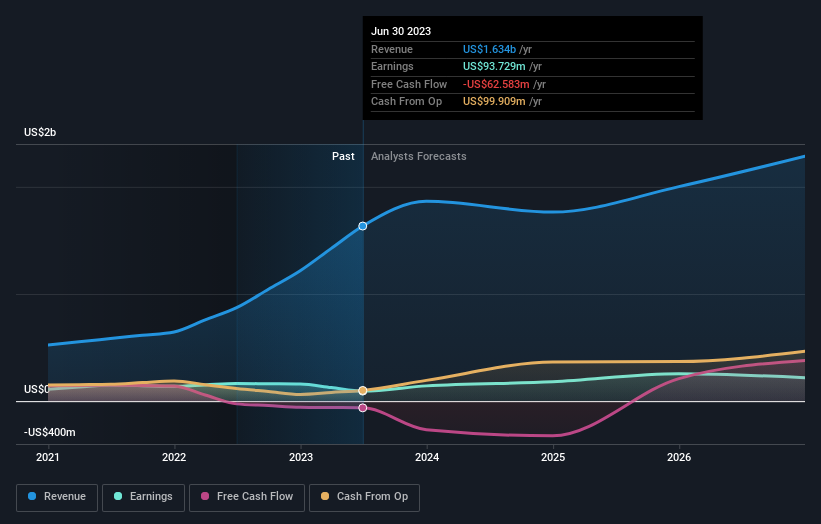Nickel Industries Limited's (ASX:NIC) market cap surged AU$900m last week, private companies who have a lot riding on the company were rewarded
Key Insights
Nickel Industries' significant private companies ownership suggests that the key decisions are influenced by shareholders from the larger public
A total of 3 investors have a majority stake in the company with 51% ownership
Every investor in Nickel Industries Limited (ASX:NIC) should be aware of the most powerful shareholder groups. And the group that holds the biggest piece of the pie are private companies with 54% ownership. Put another way, the group faces the maximum upside potential (or downside risk).
Clearly, private companies benefitted the most after the company's market cap rose by AU$900m last week.
Let's take a closer look to see what the different types of shareholders can tell us about Nickel Industries.
View our latest analysis for Nickel Industries
What Does The Institutional Ownership Tell Us About Nickel Industries?
Institutions typically measure themselves against a benchmark when reporting to their own investors, so they often become more enthusiastic about a stock once it's included in a major index. We would expect most companies to have some institutions on the register, especially if they are growing.
As you can see, institutional investors have a fair amount of stake in Nickel Industries. This can indicate that the company has a certain degree of credibility in the investment community. However, it is best to be wary of relying on the supposed validation that comes with institutional investors. They too, get it wrong sometimes. It is not uncommon to see a big share price drop if two large institutional investors try to sell out of a stock at the same time. So it is worth checking the past earnings trajectory of Nickel Industries, (below). Of course, keep in mind that there are other factors to consider, too.
Nickel Industries is not owned by hedge funds. The company's largest shareholder is Tsingshan Holding Group Co., Ltd., with ownership of 22%. With 20% and 8.5% of the shares outstanding respectively, Pt Danusa Nusantara and PT Karunia Bara Perkasa are the second and third largest shareholders. Additionally, the company's CEO Justin Werner directly holds 0.8% of the total shares outstanding.
After doing some more digging, we found that the top 3 shareholders collectively control more than half of the company's shares, implying that they have considerable power to influence the company's decisions.
Researching institutional ownership is a good way to gauge and filter a stock's expected performance. The same can be achieved by studying analyst sentiments. Quite a few analysts cover the stock, so you could look into forecast growth quite easily.
Insider Ownership Of Nickel Industries
The definition of an insider can differ slightly between different countries, but members of the board of directors always count. Company management run the business, but the CEO will answer to the board, even if he or she is a member of it.
I generally consider insider ownership to be a good thing. However, on some occasions it makes it more difficult for other shareholders to hold the board accountable for decisions.
Shareholders would probably be interested to learn that insiders own shares in Nickel Industries Limited. It is a pretty big company, so it is generally a positive to see some potentially meaningful alignment. In this case, they own around AU$182m worth of shares (at current prices). Most would say this shows alignment of interests between shareholders and the board. Still, it might be worth checking if those insiders have been selling.
General Public Ownership
With a 21% ownership, the general public, mostly comprising of individual investors, have some degree of sway over Nickel Industries. While this group can't necessarily call the shots, it can certainly have a real influence on how the company is run.
Private Company Ownership
It seems that Private Companies own 54%, of the Nickel Industries stock. It's hard to draw any conclusions from this fact alone, so its worth looking into who owns those private companies. Sometimes insiders or other related parties have an interest in shares in a public company through a separate private company.
Next Steps:
While it is well worth considering the different groups that own a company, there are other factors that are even more important. Case in point: We've spotted 3 warning signs for Nickel Industries you should be aware of.
If you are like me, you may want to think about whether this company will grow or shrink. Luckily, you can check this free report showing analyst forecasts for its future.
NB: Figures in this article are calculated using data from the last twelve months, which refer to the 12-month period ending on the last date of the month the financial statement is dated. This may not be consistent with full year annual report figures.
Have feedback on this article? Concerned about the content? Get in touch with us directly. Alternatively, email editorial-team (at) simplywallst.com.
This article by Simply Wall St is general in nature. We provide commentary based on historical data and analyst forecasts only using an unbiased methodology and our articles are not intended to be financial advice. It does not constitute a recommendation to buy or sell any stock, and does not take account of your objectives, or your financial situation. We aim to bring you long-term focused analysis driven by fundamental data. Note that our analysis may not factor in the latest price-sensitive company announcements or qualitative material. Simply Wall St has no position in any stocks mentioned.

 Yahoo Finance
Yahoo Finance 

